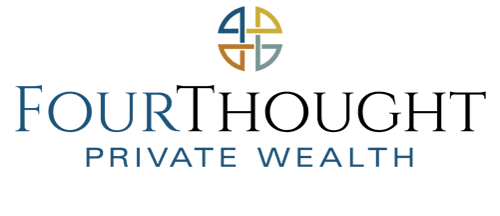At FourThought Private Wealth we have four main investing principals. First, we acknowledge that we are not gods and thus cannot predict the future. This speaks to the necessary humility that is required in investing and life planning. We are not in control and need to soberly recognize the fallibility of our predictions.
Second, protect the goose that lays the golden eggs, otherwise known as corpus or principal. Third, invest; don’t speculate.
Our fourth principle is that there will—underscore, bold—will be rare but consequential events, and we must always be prepared for these “floods.” I promise that was one of our principles long before the pandemic came along.
The inherent truth of the first and the fourth principles is illustrated by the pandemic, the subsequent recession, and other recent events. We couldn’t have predicted this, and we are reminded of how important it is to be prepared for whatever “flood” may come next.
Preparation is never static. To do it effectively we must constantly scan the landscape for changes, look at trends and indicators to try and adapt our plan appropriately. Not surprisingly, there are some strong change indicators on the horizon.
We see five major trends that may change the landscape permanently and will compel changes to our preparation plans including sector weights, asset allocation and the selection of companies for our portfolios.
-
Companies are recognizing the need for nimble and diverse supply chains.
Just recently, a couple of meat processors shut down and suddenly we were faced with quotas on what we could purchase. As my once teenage nephew said after I inappropriately teased him, “That ain’t cool.” No, having the nation’s food supply stressed ain’t cool.
However, supply chain management is much more complex than food supply. We are seeing breakdowns in drug manufacturing, parts supplies and even the availability of Lysol wipes (which, in a crazy coincidence, is manufactured primarily in Wuhan, China).
For decades business schools have taught the concepts of “just in time delivery” and the importance of squeezing cost out of the supply chain. Basically, it is the “Walmartization” of the economy. Both the private and public sectors are going to be sensitive to the fragility of their suppliers.
The investment implication is a resurgence of companies that rely on smaller, geographically diverse supply chains—and the growth of domestic suppliers who can fill the gaps. This has positive implications for U.S. and Mexican-based manufacturing.
-
Acute health care providers are reexamining their care and supply models.
Until now, the mantra for healthcare was to wring out all waste and needless overlap in health care capacity, including and especially inpatient hospital beds. Hospital systems spent decades shifting care to an outpatient model to increase efficiency and improve the bottom line.
You can bet that society will now demand excess capacity in health care, just as we do with electricity and food production. We will expect backups and backups to the backups. The death of Americans because of inpatient capacity issues and supply bottle necks shouldn’t and won’t be tolerated. Therefore, we can expect the U.S. government and the health care industry to move to a (yet) more regulated model with additional price controls and guaranteed profits to ensure there are ample beds and supplies in the quest for protection against another pandemic flood.
The investment implication here is that eventually acute care providers and health care suppliers will have a more predictable demand for products and services and steady (if somewhat tamed) profits.
-
Drug companies are working with governments to loosen regulations and fast-track research, testing and approvals.
Safety or innovation, which wins? The CDC went with safety, but its top-down insistence on testing accuracy versus availability was a culpable failure. It is also clear that the world’s drug companies are “innovating to the rescue.” Expect to see looser regulations and more innovation as the world recognizes the vital importance of the pharmaceutical industry.
The investment implication is that the drug companies who can best innovative and deploy will be rewarded.
-
Everything is happening at home.
Flexible work, distance learning and telehealth are here to stay. We have learned during the pandemic that people like working from home at least some of the time and that for many companies that can work—it doesn’t necessarily mean that production decreases.
In one example of this, a large manufacturer in our town, Tervis, discovered that sending its employees to work from home was so successful there was no need for the large building it owned. It put the building up for sale.
When our team at FourThought was forced to work from home, we discovered some things about ourselves that were unexpected–some big, some small. For example, when my longtime associate Pam started working from her home we gave her one of our extra standing desks. She admitted that she would have never tried using one but now that she has, she loves it.
The ability to work from home successfully, as well as talk to our doctors, socialize with our friends and educate our children at home are enabled by technology. Writ large, technology is the winner here.
The investment implication is to expect technology and the countries that produce it well to win more. The at-home activities it enabled will grow. Expect more people to adopt the cloud, conduct video meetings in lieu of meeting in person, utilize telehealth, and even meet with their financial advisors online.
At FourThought we are living this. We are investing heavily in technology that augments and even enhances communication between our clients, financial advisors, and relationship managers. It will increase the speed of our service and allow us to customize communication, so our clients can interact through the channels they prefer. The way we do business will change incrementally yet radically because of technology. This is true of nearly all professions.
-
Unsubstantiated predictions are running rampant.
There are some big predictions being made that are causing some people to default to their natural biases, linear thinking, and pattern recognition. Unfortunately, this can lead to poor investment decisions.
For example, many are predicting “the death of the big city.” It is true that there is a spike in demand for suburban real estate. I recently listened to an interview with Glen Kalman, the CEO of the big online real estate company RedFin. He also said that home buyers are no longer interested in open floor plans because they want private rooms for at-home works spaces—and that traffic for properties in towns and cities with 50,000 to 100,000 people is up 160% over the last three months.
The move towards urbanization is centuries long, so we are skeptical. The investment implication is to buy that downtown condo you’ve been eyeing in your dream city when prices are down.
Another prediction that feels false to us is that online education will persist and revolutionize how children are taught.
It is undeniable that many are comfortable with it and can learn easily online. Ask a young person to figure something out and the first thing he or she will do is turn to YouTube. However, a recent New York Times article about a 25-year-old fourth grade teacher in Ohio made my heart sink. She told the story of a boy in her class who got so frustrated with the “try again” feature of online learning that he just gave up.
The situation amplified the reality that we all learn in different ways and that professional teachers are trained to recognize and adapt to learning styles. Teaching takes real intelligence—not artificial intelligence.
Investment implication: look for companies that find a way to augment educational services, not automate them.
To help ensure that we and our clients are prepared for the next flood, we must analyze and sometimes invest in companies that are defining trends. It’s a little like surfing. Experienced surfers have a way of looking to the horizon and distinguishing a rideable wave from a dud. They are also quick to peel off from the unproductive wave so they don’t waste time.
Being able to identify the right wave is important to surfers, investors, and everyone who believes, like we do, in the importance of continuous and adaptive preparation.

